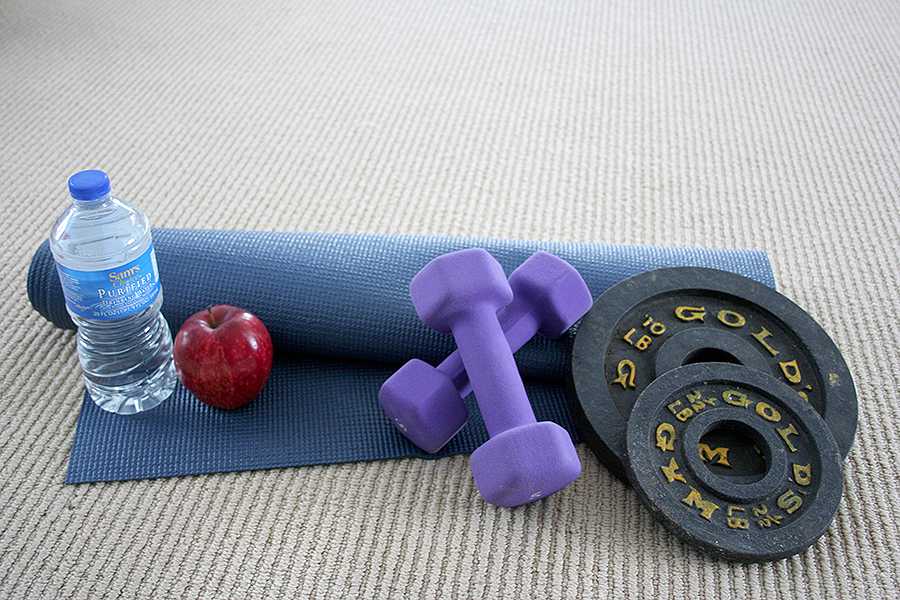Relieve stress in the aftermath of midterms
The Wehr Center is a great place to relieve stress by working out.
March 6, 2014
Exams, papers, projects, reading, internships, club activities, oh my! These are just a handful of the tasks students are presented with every day, and sometimes it can get a little overwhelming. So what do you do to bring the stress level down a notch? Scream? Cry? Panic? Have no fear. It is actually easier than you think.
Many people tend to forget that sometimes keeping things simple is the way to go. And for ways to reduce stress, it is no different. Just remember these five things:
1. Sleep.
2. Exercise.
3. Eat Right.
4. Relax.
5. Have Fun.
Seems simple, right? Yet students tend to struggle with those very simple tasks because they are so much easier to push aside to accomplish more timely matters. Sleep won’t get you an “A,” will it?
Getting enough sleep at night seems like a wonderful dream that you always wake up from right before the best part. And sometimes even falling asleep is the harder part because your brain is running mad with all the stuff you need to get done.
Cary Knier, director of counseling services and campus counselor of Lakeland College, advises to “keep your bed for sleeping.” Doing homework in bed teaches the brain that sitting in bed does not necessarily mean it is time to sleep. In return, it causes trouble with falling asleep. Another tip is to give yourself a half hour or so to unwind and relax before you finally call it a night, and always try to get seven to nine hours of sleep.
Exercise also helps reduce stress because it releases endorphins and lowers cortisol levels. According to the Mayo Clinic, when you are stressed, your body keeps releasing cortisol, and it can potentially cause anxiety, sleep problems, depression and memory and concentration impairments. Sound familiar? If you are experiencing any of those, lowering your coritsol levels through simple exercise may help!
Eating right is also important to keep your brain focused. Sherry Carstens, director of the health center and campus nurse, advises students to avoid junk food like chips and candy and replace them with healthy foods like fruit, vegetables and proteins.
Finally, relax. Literally, take a moment to sit and do nothing. Knier says that relaxing breathing exercises, yoga, meditation and guided relaxation exercises can help reduce your stress. And if you are looking for any guided exercises, Knier has some online under the Counseling page in Campus Life of My.Lakeland. Lakeland also offers yoga classes on Mondays and Wednesdays.
How often do you take time to do the activities you enjoy? With all the homework and tasks students need to do, sometimes the thought of doing something fun seems out of the question. However, Knier believes that forcing yourself to have leisure time is important. Taking that time to laugh, smile and enjoy yourself can make the rest of the craziness of student life seem not so bad. It gives you an incentive to keep on working because you still get some time to play afterward.
“Focus on one thing at a time. Otherwise, you are 10 steps ahead in your mind, and you are never really focused on what you are doing right now,” Knier said.
It is sometimes hard to find a balance for everything, especially when you have just left home, where you likely had cooked meals, set bedtimes and rules to keep life orderly. In any case, Carstens says it is important to try and stay with it. Make it an appointment for yourself to sleep, exercise, eat right, relax and have fun—treat it like a mandatory doctor’s appointment. Forcing yourself to have leisure time and to fit those needs in helps you lower stress and become a more productive and successful person.
If you ever need to talk to someone or need help learning to relieve your stress, you are always welcome to talk to the counselors of Lakeland College. They are located by the Security Office and Nurse’s Office. Additionally, if you are just having a bad day and need a smile, Knier’s dog, Benny, comes to visit every Wednesday at her office.


